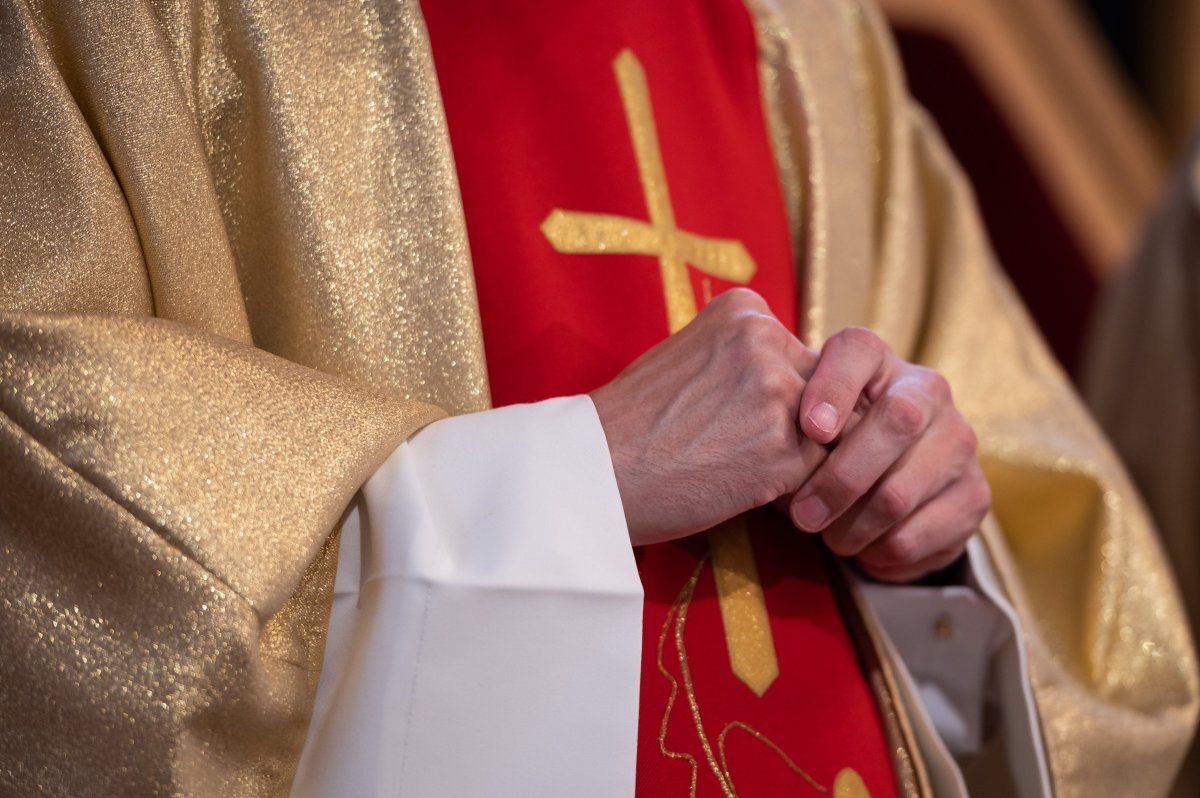The United States Conference of Catholic Bishops (USCCB) released its annual report on religious freedom this week, suggesting the five most significant threats to religious freedom in the United States.
The stated purpose of the USCCB is to “promote and continue Catholic activities in the United States.”
A September 2023 Pew Research poll shows that about 47% believe they are religious in some way, with an additional 33% saying they are at least spiritual.
The report highlights problems with policy proposals from the left and right, including abortion access, border security and religious freedom.
So, what are the key issues?

Dziurek/Getty Images
Attacks on churches and hate crimes
Above all, the USCCB declared that “attacks on places of worship” pose “the greatest threat to religious freedom in 2024.”
He expressed concern that right-wing and left-wing extremists could be a problem in an election year. Politics in the United States is extremely divided.
“The highly tense atmosphere surrounding the 2024 elections could lead far-left extremists to intensify their attacks on Catholic churches,” the USCCB said.
“Right-wing extremists may view Catholic churches and Catholic charities as targets of anti-immigrant sentiment or, even worse, violent action.”
The report contained a forecast for 2024 that the war between Israel and Hamas in Gaza would lead to an increase in anti-Muslim and anti-Semitic attacks.
Between October 7 and December 7 of last year, the Anti-Defamation League recorded 2,031 anti-Semitic incidents in the United States. The same period the previous year saw 465 incidents. The war broke out on October 7 after Hamas launched an attack in Israel that killed around 1,200 people and took hundreds of hostages. Israel responded with a bombing campaign and a military operation aimed, it said, at eradicating Hamas in Gaza, but faced heavy criticism.
The Council on American-Islamic Relations (CAIR) recorded 2,171 incidents between October 7 and December 2.
CAIR National Executive Director Nihad Awad said in a statement that he was concerned that “Islamophobia and anti-Palestinian racism would continue to spiral out of control” due to the situation in the Middle East.
Abortion legislation and transgender procedures
There are two perceived threats in this section due to USCCB concerns regarding specific legislation.
The report comes at a time of division on key issues with religious overtones, including abortion. In 2022, the United States Supreme Court knocked down the Roe v. Wade decision that previously granted universal access to abortion care in the United States
Currently, states have the power to prohibit access to abortion, and many Americans continue to oppose it on religious grounds, believing that life begins at conception and that there should be no reason to abort, whatever the circumstances.
Others do not believe in a total ban but believe that restrictive measures should be put in place. Critics, or those who describe themselves as “pro-choice,” view abortion as a fundamental health care right.
The U.S. Department of Health and Human Services (HHS) is proposing to expand Section 1557 of the Affordable Care Act, a section that specifically addresses the ban on “discrimination based on race, color, national origin, sex, age or disability in health programs or activities that receive federal financial assistance.
HHS said it plans to expand it through a “final rule” that does not revoke or amend existing law.
Critics of the proposed rule say they are concerned that some private plans will have to perform medical procedures for transgender people and provide abortion care.
There is currently “no greater threat to religious freedom” than this regulation, the USCCB said in its report.
“(The legislation) appears specifically intended to force Catholic hospitals and religious health professionals to perform harmful gender transition procedures, including on children…The final regulations could also include a mandate to perform abortions. “
Republican Reps. Virginia Foxx of North Carolina and Rick Allen of Georgia wrote a joint letter to the Secretary of Health and Human Services. Xavier Becerra in November 2022. They said the proposed rule was “another front in Democrats‘ongoing culture war.’ News week has contacted HHS for comment.
Proponents of gender-based care say the process is vital for allowing transgender people to transition into their affirmed gender. A person’s stated gender refers to the gender they wish to be known as.
The USCCB said in July 2022 that it was also concerned that HHS would not grant exemption requests based on religion.
Parts two and five of the USCCB report summary address abortion care, but section five challenges another final rule.
The Equal Employment Opportunity Commission (EEOC) has proposed a final rule on the Pregnant Workers Fairness Act (PWFA) that says abortion is a legitimate reason for employers to make “reasonable accommodation” at work.
This would mean employers granting things like breaks or having to change job duties because a person has undergone abortion care.
Under the proposal, abortion care falls under “pregnancy, childbirth, or related medical conditions.” The general term also includes: previous pregnancies; potential pregnancy; lactation; current pregnancy; use of birth control; stillborn; miscarriage; endometriosis and menstruation.
It also includes “having or choosing not to have an abortion.”
In a statement, the Christian organization Alliance Defending Freedom criticized the PWFA’s expansion plan, which was bipartisan legislation.
The group’s lead attorney, Julie Marie Black, said in a statement that “Congress sought to help pregnant workers, not force employers to facilitate abortions.
“The Biden administration is hijacking a bipartisan law that doesn’t even mention abortion to forcibly require every American employer to provide ‘reasonable accommodations’ for their workers’ elective abortions.”
The USCCB agreed, and its 2024 report said this amounts to making “private entities complicit in second- and third-trimester abortions.”
News week has contacted the EEOC for comment.
Gendered sports and harassment
The USCCB report contains the assertion that people working “in schools, workplaces (and) health care” were forced to “conform to the orthodoxy of gender ideology “.
It referred to “various actions of federal agencies” but specifically mentioned Title IX regulations. Title IX says: “No person in the United States shall, on the basis of sex, be excluded from participation in, be denied the benefits of, or be subjected to discrimination in any educational or training program.” an activity benefiting from federal financial assistance. »
The American Civil Liberties Union (ACLU) calls Title XI, introduced under President Richard Nixon, “a pillar (sic) of 40 years of efforts to promote and establish gender equity in schools.”
The Biden administration’s proposed rule would prevent federally funded schools from imposing bans on transgender athletes, something transgender advocates have long campaigned for.
There is a catch, however: Young athletes would generally be allowed to compete according to their asserted gender, but that would become more difficult as they get older. There are also specific provisions for different sports depending on the levels of physicality offered within the framework.
The proposed rule has been blocked, frustrating its supporters over opposition from transgender activists who believe it does not go far enough and Republicans who find it too indulgent.
In June 2022, the USCCB said the proposed rule “could portend a threat to women’s athletics, gender-segregated spaces, and the right of students, parents, and teachers to tell the truth about who they are.” human.”
He expressed concern about potential sexual harassment penalties proposed by the EEOC, which said that “intentional and repeated use of a name or pronoun inconsistent with the person’s gender identity ‘individual’, also known as ‘misgender’, amounted to sexual harassment.
Border security
The Republican-backed “Secure the Border Act” is a concern for religious leaders, the USCCB said.
Proposed in May 2023, then Speaker of the House Kevin McCarthyMajority Leader Steve Scalise, Republican Conference Chair Elise Stefanik and Majority Whip Tom Emmer openly supported the bill.
Its goal was, among other things, to force the Biden administration to restart construction of a border wall, a key part of Trump’s policies at a time when the White House faces continued criticism over the politicized border crisis.
The text of the bill states that a non-governmental organization could be denied funding if it “facilitates or encourages illegal activity, including illegal entry.”
In its report, the USCCB said the bill contained “problematic provisions” that could prevent it from observing Catholic and Christian doctrine regarding “welcoming the stranger, feeding the hungry (and) housing the homeless.
News week has contacted Stefanik, Emmer and Scalise for comment.
The Biden administration said it would not support the Border Security Act in a statement last May, saying the law would “cut off almost all access to humanitarian protections in a manner inconsistent with international values and obligations.” of our nation.”
Uncommon Knowledge
Newsweek is committed to challenging conventional wisdom and finding connections in the search for common ground.
Newsweek is committed to challenging conventional wisdom and finding connections in the search for common ground.


